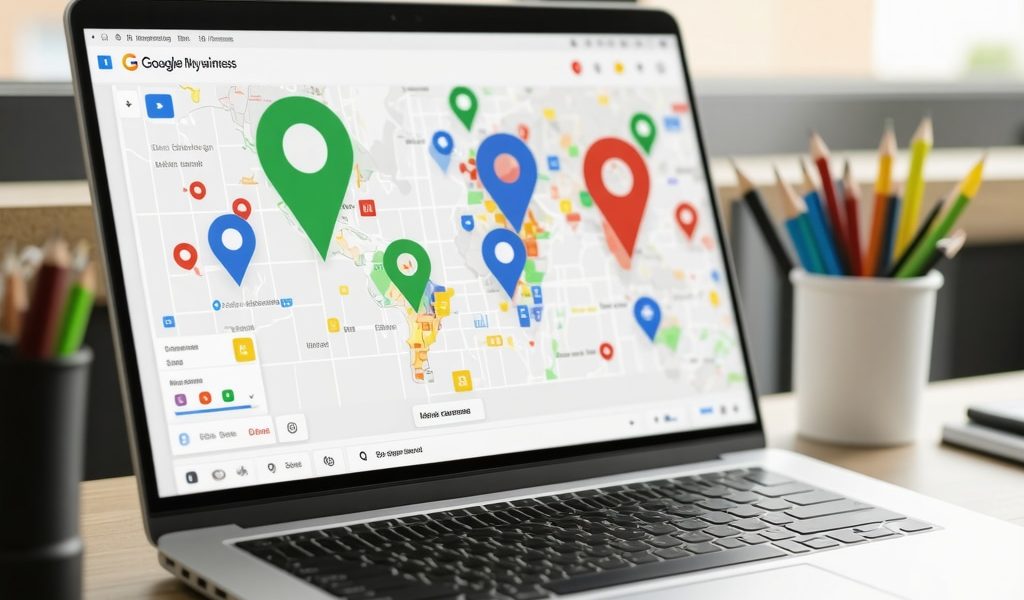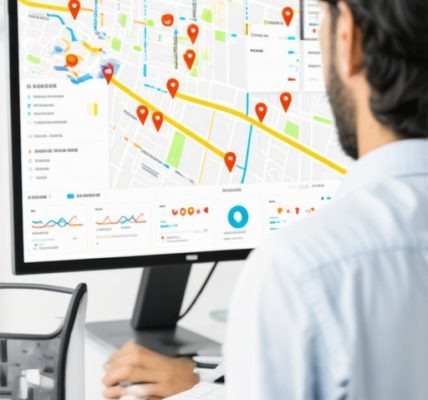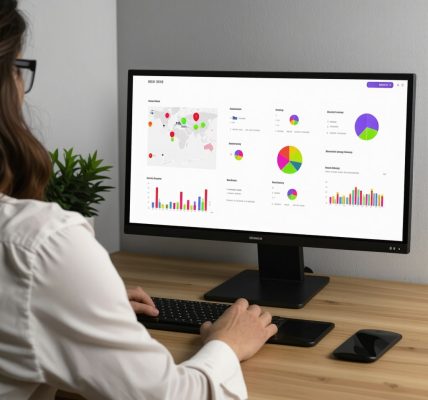Unlocking the Power of GMB Citations: Beyond Basic Listing
In the fiercely competitive local SEO landscape, mastering Google My Business (GMB) citation management is no longer optional—it’s a strategic imperative. While many businesses maintain basic citations, advanced citation management demands a refined approach that can significantly elevate your local rankings and online visibility. This article dives deep into expert tactics that leverage citation nuances and local SEO signals to propel your business ahead.
Strategic Consistency: The Cornerstone of Citation Authority
At the heart of citation management is the principle of name, address, and phone number (NAP) consistency. However, advanced strategies emphasize the importance of uniform formatting across all platforms, including abbreviations, suite numbers, and phone formats. For example, variations like “St.” vs. “Street” or different phone number formats can dilute your citation strength and confuse search engines. Using tools such as Moz Local or BrightLocal can help audit and enforce this consistency, ensuring your business signals remain strong and authoritative.
Quality Over Quantity: Selecting High-Impact Citation Sources
Not all citations carry equal SEO weight. Prioritize listings on highly authoritative, niche-relevant directories that align with your industry and geographic focus. For instance, a local legal firm should target specialized legal directories in addition to well-known local citation sites. This selective citation approach enhances relevance and trustworthiness signals to Google’s algorithm, which values domain authority and topical relevance as key ranking factors. Avoid low-quality or spammy directories that may harm your SEO profile.
How Can Advanced Citation Management Mitigate Duplicate Listings and Boost Rankings?
Duplicate listings can fragment your business information and confuse search engines, undermining your local SEO efforts. Advanced citation management involves systematically identifying and resolving duplicates by claiming or removing redundant profiles. This process requires detailed audits and sometimes direct engagement with directory support teams. Properly consolidated citations consolidate link equity and improve local pack rankings. Additionally, resolving duplicates aligns with Google’s guidelines, fostering greater trust and credibility.
Integrating Rich Data: Adding Depth to Your Citations
Elevate your citations by embedding rich metadata such as business hours, services offered, payment options, and even geo-coordinates where possible. Rich citations provide more context and enhance your local relevance. This semantic enrichment helps search engines better understand your business offerings and location, which can translate into higher rankings and improved user engagement. Moreover, keeping these details updated, especially with seasonal changes or special hours, signals active management and reliability.
Leveraging Structured Data and Backlink Synergies
Complement your citation strategy by implementing schema markup on your website to reinforce NAP consistency and business attributes. Structured data markup enhances Google’s ability to parse your business info directly from your site, creating synergy with external citations. Furthermore, building backlinks from citation sources or related local websites can amplify your local authority, driving not just rankings but also referral traffic. This combined approach reflects a sophisticated local SEO ecosystem that few competitors fully exploit.
Real-World Application: A Case Study in Citation Excellence
A boutique fitness studio in Austin, Texas, experienced a 35% increase in local search visibility after conducting a thorough citation audit and cleanup, followed by targeted submissions to industry-specific directories and regular updates of business information. By integrating schema markup and securing backlinks from local event sites, the studio successfully outranked larger competitors in Google Maps results, directly contributing to a measurable increase in foot traffic and membership sign-ups.
For those eager to dive deeper into expert GMB citation strategies, our comprehensive guide on GMB citation management offers advanced insights and actionable techniques.
Interested in elevating your Google Business Profile’s local rankings? Share your experiences or questions in the comments below to join a community of local SEO enthusiasts and professionals.
For authoritative insights on citation importance and local SEO best practices, see the Moz Local Search Ranking Factors Study, a definitive resource in the SEO industry.
Enhancing Citation Accuracy with Automated Monitoring Tools
Maintaining citation accuracy is an ongoing challenge, especially for businesses with multiple locations or frequent changes. Automated monitoring tools like Whitespark and Yext provide continuous scanning of citation sources to identify inconsistencies or outdated information promptly. These platforms alert you to discrepancies, enabling swift corrections that protect your local SEO equity. Such proactive management minimizes the risk of ranking drops caused by citation inaccuracies and keeps your business aligned with Google’s evolving standards.
Unlocking the Power of Schema Markup for Local Business Listings
Implementing schema markup is a technical yet rewarding strategy that enriches your business data in the eyes of search engines. LocalBusiness schema types allow you to embed structured information such as services, reviews, event dates, and geo-coordinates directly into your website’s code. This semantic clarity helps Google display enhanced snippets, which can improve click-through rates and user engagement. Integrating schema with your GMB citations creates a unified data ecosystem that reinforces your business’s authority and relevance.
What Are the Most Effective Strategies to Combat Citation Spam and Preserve Your Local SEO Integrity?
Citation spam—where competitors or malicious actors create fake or misleading listings—can severely damage your local SEO profile. Experts recommend regular audits to detect spammy or irrelevant citations using tools like BrightLocal’s Citation Tracker. Upon identification, businesses should claim legitimate listings and report fraudulent ones to directory administrators or Google directly. Maintaining a clean and authentic citation profile not only safeguards your rankings but also builds trust with prospective customers searching for reliable local services.
Harnessing Local Backlink Opportunities Through Citation Networks
Beyond traditional citations, leveraging citation networks for backlink acquisition amplifies your local SEO impact. Engaging with local chambers of commerce, industry associations, and community event pages provides authoritative backlinks that complement your GMB citations. These backlinks send strong trust signals to search engines and drive referral traffic from relevant local audiences. A strategic backlink campaign aligned with citation management elevates your overall local search prominence, enabling faster and more sustainable ranking improvements.
Dynamic Citation Updates: Adapting to Seasonal and Market Changes
Local businesses often experience fluctuations in hours, offerings, or contact details due to seasonality or market shifts. Dynamic citation updates ensure that all directory listings reflect these changes promptly, preventing customer frustration and negative user experiences. Automated platforms or scheduled manual reviews can help maintain synchronized information across all citation sources. This level of diligence demonstrates active business management, a factor increasingly recognized by Google’s local ranking algorithms.
For a deeper dive into how to leverage these advanced citation strategies and optimize your Google Business Profile effectively, explore our detailed resource on how to optimize your Google Business listing effectively. Join the discussion by sharing your own citation challenges or successes in the comments below to foster knowledge exchange among local SEO professionals.
For authoritative guidance on the technical implementation of schema and citation best practices, refer to the Google Structured Data for Local Businesses documentation, an essential resource for SEO experts aiming for precision and compliance.
Proactive Defense Against Citation Spam: Safeguarding Your Local SEO Fortress
In an era where local SEO competitiveness intensifies, citation spam emerges as a stealthy adversary capable of undermining even the most meticulously curated Google My Business profiles. Citation spam involves the creation of fraudulent, duplicate, or misleading business listings by competitors or malicious actors aiming to dilute your local search presence. Advanced practitioners recognize that passive monitoring is insufficient; instead, implementing a robust, multi-layered defense strategy is critical.
This strategy begins with a comprehensive citation audit using specialized tools like BrightLocal’s Citation Tracker or Whitespark’s Citation Finder, which detect anomalies and suspicious listings that deviate from your verified business information. Once identified, prompt action is essential: claim legitimate listings you control, request removal of fraudulent entries from directory administrators, and escalate unresolved cases directly to Google through their Business Redressal Complaint Form. Maintaining a clean citation portfolio not only preserves your rankings but also fortifies your brand’s trustworthiness among potential customers.
What Are the Best Practices for Detecting and Resolving Citation Spam Without Hurting Legitimate Listings?
Addressing citation spam demands nuanced discernment to avoid inadvertently compromising authentic listings. Experts advise a methodical approach: first, verify the NAP consistency across all suspected entries. Then, cross-reference business ownership or contact details to confirm legitimacy. Employing manual verification complements automated audits, especially in complex cases where directory data may be outdated or modified by third parties.
Furthermore, leveraging Google My Business’s support channels with evidence-backed reports accelerates the removal of harmful spam listings. Regularly scheduled citation health checks, combined with vigilant monitoring of new citations, create a sustainable defense mechanism. This proactive stewardship ensures that your local SEO equity remains intact and continuously optimized.
Strategic Local Backlink Acquisition Through Citation Networks: Elevating Your Authority and Visibility
Beyond the foundational role of citations, advanced local SEO experts harness the latent power of citation networks to secure high-quality backlinks—an untapped resource for amplifying local authority. Citation networks encompass a diverse ecosystem of local chambers of commerce, industry-specific associations, community event pages, and trusted local news outlets. These platforms provide backlinks that are contextually relevant and geographically pertinent, factors that Google’s algorithm heavily weighs for local rankings.
Engaging with these networks requires a deliberate outreach strategy: identify organizations with high domain authority and an active online presence, demonstrate mutual value propositions, and contribute meaningful content or sponsorships that naturally earn backlinks. This symbiotic relationship not only enhances your backlink profile but also embeds your business within the local community’s digital fabric, fostering organic referral traffic and brand recognition.
Moreover, integrating backlink acquisition efforts with your citation management amplifies the SEO synergy. For instance, securing a backlink from a local business directory that also hosts your citation consolidates your signals, reinforcing your business’s legitimacy and prominence in the eyes of search engines.
Harnessing Real-Time Citation Analytics: Transforming Data Into Tactical SEO Advantages
Modern local SEO transcends static citation management by leveraging real-time analytics to monitor citation performance and user engagement metrics. Tools like Google Analytics combined with local rank tracking platforms enable businesses to correlate citation accuracy and backlink acquisition with tangible KPIs such as click-through rates, phone call volumes, and foot traffic conversions.
By analyzing temporal patterns and geographic user behavior, SEO professionals can fine-tune citation updates, prioritize backlink efforts in high-value locales, and dynamically adjust business information during peak seasons or promotional periods. This data-driven methodology transforms citation management from a maintenance task into a strategic growth driver, uncovering nuanced opportunities for competitive differentiation.
For an in-depth exploration of proactive citation monitoring and leveraging backlink ecosystems, consult the Search Engine Land article on Local Citation Cleanup and SEO Impact, a definitive resource that addresses evolving citation challenges with actionable expertise.
Ready to elevate your local SEO strategy with cutting-edge citation and backlink tactics? Engage with our expert community by sharing your citation management experiences or questions below, and unlock tailored advice from seasoned local SEO professionals.
Deep Dive Into Real-Time Citation Analytics: The Hidden Key to Local SEO Mastery
While traditional citation management focuses on establishing and maintaining consistent NAP data, real-time analytics elevate this practice by transforming raw citation data into actionable intelligence. By integrating tools such as Google Analytics with localized rank tracking solutions, businesses can dissect user interaction trends tied to citation sources, revealing which platforms drive the most qualified traffic and conversions.
This granular insight allows SEO professionals to dynamically prioritize citation updates and backlink outreach based on empirical performance rather than assumptions. For example, if a certain directory consistently generates higher call volumes or web visits, reinforcing the citation quality and backlink profile there can yield disproportionate ROI. Furthermore, temporal analytics help identify seasonally driven changes in user behavior, enabling proactive adjustments to business hours or special offers reflected across citations.
How Can Local Businesses Leverage Real-Time Citation Data to Outmaneuver Competitors in Hyper-Competitive Markets?
To capitalize on real-time citation data, businesses should deploy a monitoring framework that correlates citation accuracy and backlink sources with key performance indicators such as click-through rates, phone inquiries, and in-store visits. This requires implementing event tracking in analytics platforms and employing geo-segmentation to focus on high-value micro-markets.
Continuous performance reviews empower rapid iteration—adjusting listings, refreshing content, or acquiring backlinks precisely where metrics indicate the greatest impact. Additionally, coupling these insights with competitor citation audits exposes gaps and opportunities to capture incremental local market share.
Next-Level Backlink Strategies: Cultivating Authoritative Local Networks for Sustainable Growth
Beyond citation quantity and quality, strategic backlink acquisition from authoritative local entities forms the backbone of advanced local SEO. Establishing reciprocal relationships with chambers of commerce, neighborhood blogs, and event sponsorships generates backlinks that not only enhance domain authority but embed your business within trusted community ecosystems.
Targeting backlinks with contextual relevance—such as guest posts on local industry-specific websites or partnerships with complementary service providers—amplifies topical authority, a critical search ranking factor. Moreover, aligning backlink efforts with citation sources consolidates SEO signals, creating a robust, coherent online presence that signals credibility to search engines and users alike.
Proactive Citation Risk Management: Navigating Algorithmic Changes and Emerging Threats
In the evolving landscape of local SEO, citation management must incorporate risk mitigation strategies to safeguard against algorithm updates and malicious interference. Employing continuous citation health audits paired with automated anomaly detection tools helps identify sudden drops in citation accuracy or the emergence of spammy listings that could trigger ranking penalties.
Incorporating AI-driven monitoring solutions can anticipate potential citation vulnerabilities by analyzing patterns indicative of emerging threats, allowing preemptive remediation. Furthermore, maintaining transparent documentation of citation sources and changes facilitates rapid recovery and compliance with search engine guidelines, preserving local SEO integrity.
For those aiming to stay at the forefront of citation and backlink innovation, the Search Engine Land article on Local Citation Cleanup and SEO Impact remains an indispensable resource offering cutting-edge strategies validated by industry leaders.
Ready to transcend conventional local SEO tactics? Engage with our expert community by sharing your advanced citation management challenges or insights below and unlock bespoke strategies tailored to your business’s growth ambitions.
Frequently Asked Questions (FAQ)
What exactly are Google My Business (GMB) citations and why are they crucial for local SEO?
GMB citations refer to any online mention of your business’s name, address, and phone number (NAP) on external websites, directories, and platforms. They act as trusted signals that help search engines verify your business’s existence and location, thereby improving your local search rankings and visibility in Google Maps and local packs.
How does NAP consistency impact my local search rankings?
NAP consistency ensures that your business information is uniform across all citations and listings. Variations in formatting or discrepancies can confuse search engines and weaken your local SEO authority. Consistent, accurate NAP data strengthens your credibility and enhances your chances of ranking higher in local search results.
Can schema markup really improve my GMB citation effectiveness?
Yes, schema markup adds structured data to your website, enabling search engines to better understand your business details such as services, operating hours, and location. When combined with your external citations, schema markup creates a unified data ecosystem that enhances your online presence and can lead to rich snippets, which boost click-through rates.
What strategies should I use to identify and remove duplicate or spammy citations?
Utilize specialized tools like BrightLocal, Whitespark, or Moz Local to audit your citations regularly. Manually verify suspicious listings by checking ownership and contact details. Report fraudulent or duplicate listings to directory administrators and Google’s Business Redressal Complaint Form. Maintaining a clean citation profile is essential to protect your local SEO integrity.
How can backlink acquisition through citation networks enhance my local SEO?
Building backlinks from authoritative local entities such as chambers of commerce, industry associations, and community organizations amplifies your domain authority and local relevance. These backlinks complement your citations by signaling trust and topical authority to search engines, which can improve your rankings and drive qualified referral traffic.
What role do automated monitoring tools play in citation management?
Automated tools continuously scan your citations across multiple platforms to detect inconsistencies, outdated information, or new erroneous listings. They provide timely alerts for corrective action, helping maintain citation accuracy and protecting your local SEO equity amid frequent business changes or multiple locations.
How can real-time citation analytics influence my local SEO strategy?
Real-time analytics enable you to track which citation sources generate the highest user engagement, calls, or foot traffic. This data-driven insight allows prioritizing citation updates and backlink efforts where they yield the greatest ROI, enabling dynamic adjustments aligned with market fluctuations and competitive benchmarking.
What are effective ways to adapt citations for seasonal or market changes?
Implement scheduled manual reviews or use automated platforms to update your business hours, offerings, and contact details across all citation sources promptly. Keeping this information current demonstrates active management to Google and ensures a positive user experience, which supports higher local search rankings.
How do I safeguard my citations against malicious citation spam?
Maintain vigilance with regular citation audits and automated anomaly detection tools. Quickly identify and dispute fraudulent listings by providing evidence to directories and Google. Establish a proactive monitoring system to prevent ranking damage and uphold your brand’s trustworthiness in local search.
Is quantity of citations or quality more important for local SEO?
While having numerous citations can help, quality and relevance are paramount. Prioritize authoritative, niche-specific, and geographically relevant directories that align with your business. Low-quality or spammy citations can harm your SEO, so strategic selection and maintenance of citation sources are critical for sustainable local SEO success.
Trusted External Sources
- Moz Local Search Ranking Factors Study: An authoritative, data-driven analysis of the key factors influencing local search rankings, including citation quality and consistency. This source provides valuable benchmarks and industry insights for citation strategy development.
- Google Structured Data for Local Businesses Documentation: Official Google guidelines detailing schema markup implementation for local businesses. Essential for understanding how to technically enhance your website’s local SEO and integrate with GMB citations.
- BrightLocal Citation Tracker and Whitespark Citation Finder: Leading SEO tools specialized in citation audits, monitoring, and spam detection. They offer practical insights and automation capabilities critical for advanced citation management.
- Search Engine Land – Local Citation Cleanup and SEO Impact: A seminal resource that explores the importance of clean citations, real-time analytics, and risk management in local SEO. This article guides practitioners through evolving citation challenges with expert tactics.
- Google My Business Help Center and Business Redressal Complaint Form: Official channels for managing your GMB listings and reporting fraudulent or duplicate citations, ensuring compliance and proactive reputation management.
Conclusion
Mastering advanced Google My Business citation management is a cornerstone for dominating local SEO in competitive markets. By ensuring meticulous NAP consistency, curating high-quality and niche-relevant citation sources, integrating schema markup, and proactively combating citation spam, businesses can significantly enhance their local search authority and visibility. Leveraging real-time citation analytics and strategic backlink acquisition through local networks further transforms citation management from a routine task into a dynamic growth engine. Staying vigilant with automated monitoring tools and adapting citations to market changes ensures sustained SEO resilience and customer trust.
Embrace these expert strategies to unlock the full potential of your GMB citations and elevate your local search performance. Share your experiences, ask questions, or explore our related expert content to deepen your mastery of local SEO success.



